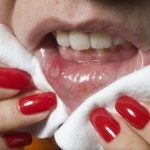
Recurrent aphthous stomatitis (RAU) may affect up to 25% of the population. RAU is characterised by recurring small ulcers typically affecting non-keratinised mucosa in adolescents and young adults. The aetiology of RAU is unclear, and a wide range of predisposing factors have been suggested. Treatment is usually symptomatic and wide range of medicaments have been used including corticosteroids, antiseptic mouthwashes, analgesics, anaesthetics, antibiotics and various herbal remedies. Hyaluronic acid (HA) has recently been introduced for the management of RAU with variable results.
The aim of this review was to assess the efficacy of topical hyaluronic acid for reducing the signs and symptoms of recurrent aphthous stomatitis.
Methods
Searches were conducted in the Medline/PubMed, Scopus, Web of Science and Google Scholar databases. Randomised (RCT) and non-randomised controlled clinical trials (nRCT) of topical hyaluronic acid (HA) against any medical intervention or placebo were considered. Two reviewers independently screened the studies, extracted data, and assessed quality using the Cochrane risk of bias tool. Owing to study variability a narrative summary was presented.
Results
- 9 studies (8 RCTs, 1 nRCT) involving a total of 538 patients were included.
- 5 studies were considered to be at high risk of bias, 3 at unclear risk and one at low risk.
- 3 studies were conducted in Egypt, 2 in Iraq, and one each in China, Turkey, UK and the USA.
- 5 studies involved minor recurrent aphthous stomatitis (RAS), one major and minor RAS with 3 studies not reporting the type of RAS.
- 7 studies used HA gel, one a mouthwash and one a spray.
- 8 studies reported comparable-to- superior pain-reduction efficacy in favour of HA compared to the different interventions assessed.
- One study reported inferior pain-reduction effect of HA compared to Diode laser.
- In comparison with triamcinolone one study found superior results in and two studies comparable results.
- No side effects were found in the 6 studies that reported on them.
Conclusions
The authors concluded: –
The available evidence suggests that HA is a promising treatment option for RAS. However, given the huge heterogeneity of the included studies and high risk of bias in some of these studies, the evidence is inconclusive. Further well-designed clinical trials with standardised methodologies and adequate sample sizes are warranted to discern the efficacy of HA for RAS.
Comments
The authors registered a protocol for the review on PROSPERO and conducted a search of a number of databases. They included 9 studies one of which was a small nRCT (25 patients) which could possibly have been excluded. The included studies were published between 2006 and 2020 so the fact that only one was considered to be at low risk of bias is disappointing as the first CONSORT statement for standards for the reporting of RCTs was published in 1996. The included studies involved different formulation, dosages, dosing and durations so meta-analysis was not feasible. While the review suggests that HA may be a potential treatment option the small number and poor quality of the studies mean that the findings are of very low certainty. As the authors indicate in their conclusion further well-designed and well reported studies of appropriate size and duration are needed to provided evidence for the efficacy of HA for recurrent aphthous stomatitis.
Links
Primary Paper
Al-Maweri SA, Alaizari N, Alanazi RH, Ashraf S, Alanazi RH, Al-Sharani HM, Halboub E. Efficacy of hyaluronic acid for recurrent aphthous stomatitis: a systematic review of clinical trials. Clin Oral Investig. 2021 Sep 20. doi: 10.1007/s00784-021-04180-4. Epub ahead of print. PMID: 34542725.
Other references
Dental Elf – Recurrent aphthous stomatitis blogs
